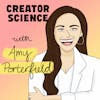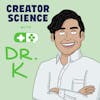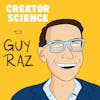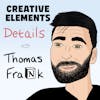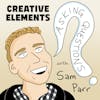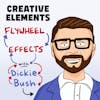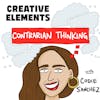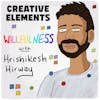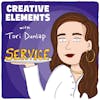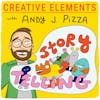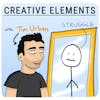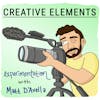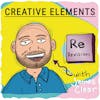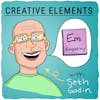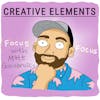
#5: Matt Giovanisci – A self-proclaimed "pool nerd" talks about web design, affiliate marketing, getting comfortable with money, and producing a rap album.
Play EpisodeMatt Giovanisci is the creator of several online businesses including Swim University, Roasty, Brew Cabin, and Money Lab.
Matt Giovanisci is the creator of several online businesses including Swim University, Roasty, Brew Cabin, and Money Lab. He is an experience affiliated marketer who has earned over $400K in one year through his main content business, Swim University. In this episode, the self-proclaimed "pool nerd" talks about web design, affiliate marketing, getting comfortable with money, and producing a rap album.
Transcript and show notes can be found here
***
LISTENER SUPPORT
Join our community on Facebook
Support this show through Buy Me A Coffee.
***
SPONSORS
Try Podia and save 15% for life as a Creative Elements listener
Start your free trial of SavvyCal and get your first month free using promo code ELEMENTS
***
ABOUT JAY CLOUSE
Subscribe to my weekly newsletter
Enroll in my course on podcasting, Podcast Like The Pros
***
PODGLOMERATE NETWORK
This show is a part of the Podglomerate network, a company that produces, distributes, and monetizes podcasts. We encourage you to visit the website and sign up for our newsletter for more information about our shows, launches, and events. For more information on how The Podglomerate treats data, please see our Privacy Policy.
Since you're listening to Creative Elements, we'd like to suggest you also try other Podglomerate shows surrounding entrepreneurship, business, and careers like Rocketship.fm and Freelance to Founder.
Learn more about your ad choices. Visit megaphone.fm/adchoices
Matt Giovanisci 0:00
Everyone fails, and then tries to spin it into a positive. You know, it's like, oh, I failed, but I learned a lot. I'm like, sometimes it sucks, and I hate failing. And I'm gonna say that it sucks. And I'm gonna say I didn't learn anything.
Jay Clouse 0:16
Welcome to Creative Elements, a show where we talk to your favorite creators and learn what it takes to make a living from your art and creativity. I'm your host, Jay Clouse. Let's start the show. Hello, thanks for tuning in to another episode of Creative Elements. Today I'm speaking with Matt Giovanisci, the creator of Money Lab. At least, that's how I knew him until I started doing some more research.
Matt Giovanisci 0:55
The very core of my business is called Swim University. It is a website where I teach people how to take care of their pools and hot tubs. And I've had it since 2006, and it makes primarily its money through affiliate links, specifically Amazon Associates, and digital product sales.
Jay Clouse 1:16
Unless you have a pool or hot tub yourself that you take care of, you may have never heard of swim University. Swim university makes its money from affiliate links on Amazon. That means Matt creates content, that content will link to a product on Amazon, and if that person buys that product, Matt gets a small kickback, somewhere between 1% and 10% of the sale. And Swim University is a thriving business. In 2019, Matt earned more than $400,000 from that website through affiliate links and product sales. Four hundred thousand dollars from one to ten percent cCommission's that's a lot of cool products being purchased from Matt's site. If you do the math, that's somewhere between 4 and $40 million in top line sales to Amazon. And as you can guess, only a small percentage of readers actually buy. So he publishes articles, YouTube videos, and more specifically with the goal of capturing search traffic of pool and hot tub owners. And if you think that sounds boring, check out this clip from the pool maintenance music video from Swim University.
Music Video 2:15
'Cause in the beginning we vacuum and swim up before we go swimming, and guess what, you keepin' the spinnin', we dippin', we sippin', we flippin', we float all day. The ancient alkalinity. We clarify the univas in university. It's three steps: circulate, clean, and chemicalize. Deep breath, go under water, and now you can open your eyes. If you wanna learn how to take care of your pool--I do, I do--just follow step 1, circulate, step two, clean it up, step three, gotta chemicalize it. Now you now just what you gotta do--I do--to keep your water looking sparkling clean. Just follow step 1, circulate, step 2, clean it up, step 3, gotta chemicalize it.
Jay Clouse 2:57
I love businesses like this. Specific, niche businesses with big revenues and big margins. Swim University allows Matt to spend a lot of time on his passion project, Money Lab, where he runs experiments for making money online. I've been following Matt and Money Lab for years because he's prolific, hilarious, and just tells it like it is. If you don't believe me, his email opt in reads, "Please, for the love of God, subscribe to get emails from me. Yes, I'm begging. I don't have a content upgrade, a shitty PDF checklist or anything like that." In this episode, we talk about building Swim University, funding his business with an unemployment check, how he became comfortable with money, and why focus has been key to his success. I'd love to hear your thoughts on this episode. As you listen, you can find me on Twitter or Instagram @JayClouse. But now let's jump into the deep end and hear how this all started.
Matt Giovanisci 3:54
So I was working at a pool store. So I was, I've been in the pool industry since I was 13. So I've always worked in pool and hot tub, you know, in some capacity. And I was, I remember working at the store, and I was also designing and building a website. I was learning how to design and build a website for my band. I had a, I had an original rock band that I was the lead singer and guitar player in. And we needed a website, couldn't afford anybody. So I just was like, Okay, well, you know, I'm just going to learn how to design a website. And I had a computer. It was like my first computer ever. So I was like, Okay, did that. And then I was like, once I had that skill, I remember sitting in this store and just saying like, okay, there's all these customers are coming in, they look to me for advice and expertise. These are adults too. Like I'm a kid. And they're coming in asking me for advice because they're, they don't know how to take care of the pool. But that's all I've ever done really. And so I'm like, Well, I can take all of this knowledge and what have you and put it on the internet. Like I know how to build a website. And so that's when I came up with Swim University. And at the, at the time, affiliate marketing was a thing. So I did know about it. I didn't know that that was a thing. But the bigger thing was AdSense...
Jay Clouse 5:07
Hmm.
Matt Giovanisci 5:07
...to me. So, originally I had thought, I'm gonna make my money selling, like having AdSense, I can easily put AdSense on the on a website. That was, that was a no brainer. But then it was, well, I'll just sell my own ads directly to these pool companies, because I had relationships with them already, just, you know, a different relationship. So I'm like, Okay, well, I, this is how I'm gonna do it. And then I'm like, Well, okay, affiliate marketing is a thing. And I forget, oh, what was it? I think it was called Link Share at the time. So there's a company called Link Share, and I think even Google had Google Double Click or Google affiliate something. Yeah, cuz I know they still run it, but it's for ads mostly. So there was something, and I had those, and at the bottom of every post that I would write, I just would have these like four products that I'd say Oh, these are recommended products. And those products were like, you know, if I was talking about cloudy water, I would talk about a clarifier or some chlorine or whatever. And so that was my whole plan from the beginning.
Jay Clouse 6:07
When you say you're building a website in 2006, we didn't have Squarespace, we didn't have Wix, we didn't have any of this stuff. What were you doing to build a website in 2006?
Matt Giovanisci 6:14
HTML files, individual HTML files. I didn't even use WordPress. When I first started I was doing, I wasn't even doing includes. I was doing individual HTML files for every post and every element. And it was just like duplicating the HTML file over and over again. I actually know some websites in the pool industry that still run that way.
Jay Clouse 6:36
Crazy. And this was, this is before, like, online courses were big, too. So how did you even learn how to do like HTML files to build a website while you're working at this pool company?
Matt Giovanisci 6:44
I bought books. I bought like Website Builder for Dummies or whatever it was. I was in Dreamweaver, I was using Dreamweaver.
Jay Clouse 6:51
Oh wow.
Matt Giovanisci 6:51
This was before 2006, too. Like, I was building websites in like 2000. That's when I started, I think, so, because I had, I had learned how to do it. Like, Oh, my first website that I did for my band was in Flash.
Jay Clouse 7:05
Oh wow.
Matt Giovanisci 7:05
Completely. One hundred percent in Flash. And then, so I learned Flash, and then then I moved on to HTML through Dreamweaver. And then I moved on to PHP. And then I had built my own content management system because I didn't know WordPress existed. So I had built the CMS to run Swim Universities so that I could update articles on the go. At first I hid my name. So at first I was, I went by Matthew Stephens or Matt Stevens, because it's my middle name, on the website, because I didn't want my company finding out that I had this pool site and also worked at this company. And not that, not that I thought I would be fired or anything, but like--even though I was fired...I...for that exact reason--I didn't think that that was a pro...I didn't think was conflict of interest because I wasn't building it at work, like I wasn't working and then building. I would go home, build it, add, you know, articles. And it all it all came from my head. I didn't use any of their assets or anything to do it. I was just like, well I'm I can, I know how to build a website. I'm gonna do this on my spare time. And yeah, I'm like, this is my future. I definitely thought that. And I've always been entrepreneurial, and I always knew I wanted to work for myself. And I'm like, Oh, I just found the golden idea. I'm marrying two things that I'm actually really good at. And I'm like, I will make this work. I will make this work. And at first, I didn't spend a lot of time on it because I'm in the pool industry, so like, all fuckin day, I'm talking about pools. And then at the end of the day, I go home, and I'm writing about pools, and I'm like, okay, like. And I just wasn't a writer, I, I spent most of my time on tweaking the design and like, you know, learning, and learning, learning, learning, so much learning. Because what you do is you keep, you keep learning, you think that's work, and then you don't do anything and you're like, Okay, well, I have this website, it looks great, it functions very well. Uh, there's no content because you suck at writing and you hate writing. So like the one thing you really needed to do, like that's the one thing I didn't think through all the way. It's like, oh, you're not a website designer, you're a, you're going to be a writer for the rest of your life. It's like, ugh, well I hate that.
Jay Clouse 9:17
Just content for pool is like niche before niche was cool. So how did you, like, did you love pools? Were you excited to talk about pools?
Matt Giovanisci 9:24
Yeah, I consider myself a pool nerd. Or I used to. Like, I mean, here's the thing. I was 13. Like, I'm a boy. I'm a tiny little boy Not tiny, but I was a boy. And I have these adults that I like, all of my friends' parents would be coming into this pool store and asking me for help. That's a weird power trip as a 13 year old. All of a sudden, I have like this weird power over my friends' parents, and all the people in town. Like all the adults in town. And so I wrote that, like I remember I mean, I would go home and read books on pool, like, like, all these pool chemical companies would like have these manuals on like, how to take care of a pool and how to like do testing and all this stuff. I would read that because I, I had this desire to, somebody would walk in the store, and I would have to be the person they went to. You know, there'd be somebody else that he wouldn't know or she would know. And they'd be like, Well, Matt knows everything. Like even O rings, people would come in with O rings to like a random thing. And I would look at it and know. I'm like, Oh, that's a Hayward SP 200 Yeah, hold on, we got that in the back. Or Oh, we just put those on order. Like I would know. It was like kind of, like I said, a power trip to know all that stuff. And it was like, Well, now you have to put it in a format that you're not good at. I'm very good at talking. I like talking. I'm terrible at writing. I hate writing. And I didn't realize at the time, that that was what the job really was. I just knew I could build a website.
Jay Clouse 10:50
So here we have this 13 year old kid who had taught himself web design and helping adults solve all of their pool problems. But even though he wanted to work on Swim University, there was one one small problem. He was 13 years old, and 13 year old kids have to go to school.
Matt Giovanisci 11:06
I'm not, I'm not good at school. I wasn't good at school. I loved school though because of the social part. I was always really good at going to school. I don't have like, I have really like solid attendance record, because I enjoyed every single part of school except what school is really meant for, which is, you know, learning and education. So I, there was a few classes I excelled at. Actually, the first class in high school I ever failed was graphic design. And I had to learn Photoshop and I hated it. And literally, that's what I ended up doing for a living like four years later. And I failed every English class in high school, except Creative Writing. It was the only class I aced because we had to write like poems and funny stuff. So that was easy for me. It wasn't easy, I'm not grammatically good. I think I'm better now because I literally had to, I had to learn it, and I got kind of nerdy about it a little bit. You know, in my, you know, as I'm like, what I'm, I'm 36 now. So like when I was 34, maybe I started like really diving into grammar. But I was going to school and not doing well, like C's, D's, C's, getting through. Class clown, all that. I was working at a pool store at night, and I wasn't building the website yet. I was in, I went to college for two weeks twice. I went to college for two weeks, this was around 911 because I remember being in the parking lot of my college. And I dropped out, because I had an English teacher who didn't like my silliness and my creative writing. She wanted, it was a, it was English Comp, so they don't really like you taking liberties with grammar. I was like, Okay, well, I mean, everyone else thought it was funny, I guess, but she didn't. I got in a fight with her. And I'm like, screw this. This is dumb. What, I'm like I have a job. Why do I need this? I don't even, like what am I, what am I gonna do? You know? And so I left. And then I tried again the following semester, and I was like, that was even shorter. So, yeah, I just worked the whole time. I ended up working and building. My boss had caught me building a website for my band. Like I wasn't building it at work, but I looked at it through his computer because I'm like, I like to check it on different browsers. So I was, I went to, I was at work, and I looked at it, and it was on the history, and he found it and he didn't like it. Or he didn't like the fact that like, we were going on like MySpace and shit. But he was like, did you make this? And I was like, yeah. And he goes, Okay, and then like, a couple weeks later, I got the job to do the website for the company, but I was still working at the store level. And then I got a job as a website designer at a website design company, because I had friends that were like, Oh, I work at this company, they're looking for website designers, do you want to come, and I'm like, Yeah, and I like got hired instantly. Then I was, had to put on a suit and drive far. That kind of sucked. And then I got poached back by the same pool company except I was in the marketing department now. So there was a core, I was in the corporate level, running four stores and doing all the marketing for them.
Jay Clouse 14:01
So without a college degree, Matt self taught skills of web design were paying off. He had been hired back into a corporate marketing position with the same pool company that had let him go. But that didn't mean he was excited about working a job.
Matt Giovanisci 14:14
I had a job up until 2011 or '12. I can't remember which exact year, the one year...So I was working at the corporate level. I had my own office. I was you know, I had I was working with all adults, I was still young, I was still like 25. And I was you know, in control of doing all the sales, doing the website, doing print advertising, TV commercials, radio commercials, like all, I was in charge of everything. And what happened was Swim University wasn't taking off, but it was popular enough where somebody from Martha Stewart radio on Sirius found out about me and reached out to me. And I was still running the site on the side as Matt Stevens, and I was doing guest posts and stuff. But as soon as Martha Stewart came around, and not her specifically, but like her team was like--and I didn't talk to Martha--but they were like, Yeah, we do this radio show every morning, we want to, we want you to come on and talk about, you know, opening your swimming pool. I was like, Oh, yeah, what like, What's your name? I'm like, Matt Giovanisci. That's my name. Like, I want my name out there now. So I decided to take my fake name off the website and put my real name because I want to be credible. And so I went on Martha Stewart four times for different reasons. And because I was like, Yeah, I guess I was charismatic enough and they were like, Okay, well, we have a pool expert whenever we need to talk about it. And I'm talking like 15 minute, you know, conversation, but there was one day where I got on, and I took the day off at work because I thought my website was gonna blow the hell up. I thought, dude, this is it. I'm home free now.
Jay Clouse 15:50
When we come back, we hear just how life changing that spot on Martha Stewart was format right after this. When we left Matt, he had built a relationship with Martha Stewart's radio show as their go to expert pool guy. And one day, he just had a feeling that his latest appearance was going to blow up.
Matt Giovanisci 16:10
And I took the day off of work because it was like, I had to wake up at seven in the morning to do it. And I just sat by like Google Analytics, and just like kept refreshing. This was before real time analytics and, and nothing came in. Like nothing happened. And I was like, Oh, so Okay, but I did it four more times, to the point where I had gotten a job offer. So I was doing, I was doing not just Swim University, but I was doing website design on the side to make extra money. And I was making good money at the corporate level. I was doing like 40k, and I was 25 with no college degree. So I'm like, Okay, I'm okay. And then I actually bought a house. Like I have my own condo. So I'm like, I'm good to go. I think my career's pretty, like set. I've learned these skills. I have these, whatever. And so I had gotten another job offer down the street for more money, doing the same kind of work just not a pool company. And so I was like, Okay, well, my, you know, my dad's like, Man, you're sitting in the catbird seat now. You can do whatever you want, like, just pick whatever. And I was like, okay. So I decided to go to my boss and I'm like, Look, I got this other job offer, you know, I was doing website design on the side, got this job offer. I'd rather stay here. But I'm gonna need, you know, 10 grand more a year. I figured, right? Because I like the worst case scenario is I get 10 grand no matter what. It's just, do I get to move or do I stay at this company. And so he took the weekend to decide, when really he was taking the weekend to put a software on my computer to track every keystroke, and started Googling my name. And found out now I had Swim University and called me into his office the next week, and was like, You're fired. And...
Jay Clouse 17:52
Wow.
Matt Giovanisci 17:52
He said, and he's like, and I was like his right hand, man...not a right hand man. shouldn't say that. I wasn't. But I mean, I had his ear. I worked, I worked, he was my direct boss, like, I work directly next to him. And so he was just like...and I was, you know, I was the youngest person in the company, too, and he was just like, I'm not mad at you. I'm disappointed. I'm like, are you...really?
Jay Clouse 18:13
Total Dad move.
Matt Giovanisci 18:14
I was like, yeah, total dad move. I'm like, Alright, well, I mean, what did you expect to get out of this, like, I have a job, like, you could keep me. You could buy some University You could've used it to your, you know, and he didn't. So I'm like, kind of glad he didn't because I went to this other company, which wasn't pool care. And so therefore now I wasn't in the pool world all day. So I had more like mental space to come home and, and do like, and write about pool stuff or film pool videos. In fact, my boss at the new company let me borrow his video camera and his lapel mic to go out and film Swim University videos because he knew I had my thing on the side. And he was so cool with it. And then, then from there, I got laid off in either 2011 or 2012, and I knew it was coming for a couple of months. And I, at that point I'm like, okay, like this is a this is a small business loan, quote unquote. I got to take this and really like make Swim University a full time thing. And that was like, as soon as I got my unemployment check, I'm like, this is a business loan. I had to sell, I got rid of my condo, I got rid of my car, like I scaled down, moved in with my younger brother, and just did that for a year as I was collecting unemployment checks to survive and still doing website design on the side--don't tell the government. So at this point yeah, I'm, I guess it was about 2013 when I like was making roughly 40 grand a year just doing Swim University and some website design stuff on the side. But mostly just Swim University. So yeah, I was making 40 grand from Swim University and then probably another like 10 grand a year from like, website design, random here, here, things here and there and then that kept growing and got me here.
Jay Clouse 19:56
'That kept growing and got me here' is an understatement. According to Matt's interactive timeline at MoneyLab.co, that $40,000 a year in 2014 was followed by over $140,000 in 2015, nearly $270,000 in 2017, $360,000 in 2018, and more than $400,000 in 2019. For a lot of quote online business owners, they would take Matt's story and frame it as, I taught myself web design at age 13, and have been building websites for more than 20 years. They'd spin it as their hero's journey to show why they're awesome, and why you should trust them, listen to them and buy from them. But that's not Matt's approach. And when you look at his website, you see headlines that say, how I built a mildly successful six figure business in 17 years.
Matt Giovanisci 20:43
I just, I don't know. I...Look it. I feel like I should be way further along being that I've been doing this for 17 years. Like I'm like, how am I still not a multimillionaire? I am not because I really just kind of stumbled my way. through all of this, and that's kind of the way that I approach everything is like I'm not gonna, I mean, it doesn't matter how much you read or how much you learn. I mean, like, my journey is my journey and I don't know if there's a, there is no shortcuts. I'm sure I could have taken some, like, you know, moves that would have gotten me somewhere quicker, but I didn't take those moves mainly because of, ugh, artistic integrity, perhaps. You know, like I as a, as a former musician in a band, like selling out was a, was a you know, I didn't want to do that. Although I was on Martha Stewart, so I don't know, that might be selling out a little bit. But I didn't, yeah, just there's just like things that I didn't do. And I'm not a good salesman. I'm a terrible salesman, because I am just straight up honest. I tell you things like it is, and that's why I don't sell nearly as much as, as maybe somebody else.
Jay Clouse 21:49
You think that's actually holding you back? You don't think that's like a competitive differentiator of Matt's an honest guy?
Matt Giovanisci 21:55
It is. Okay, so what it does is, it's, it's slower. That's all it is. So I think what I do is I gain trust, but very slowly, because you're like, you're kind of like thrown aback like, because I've seen guys and girls, and mostly guys, I've seen them take the honesty approach to online marketing, and then I see them do it wrong. You know, like, and not, not that I invented honesty. I absolutely didn't in this particular space. I didn't do that. But I saw other people start to do it, and I'm like, you're not. And it just feels wrong to me. But then again, I haven't, I have a an eye for that. Like, I have a bullshit meter that is just like, it's constantly running. And as soon as I see somebody who's, you know, using it to their advantage, I'm like, Well, then, you know, then you're doing it wrong, but then they're probably doing it right. They're, they're taking the thing that I should be doing, and doing it. So yeah, I do think that like, what happens is like, I have a lot of fans, like real true fans. Just not a lot of them. They're there, and they they will like, and they say it to me. But there's not that many because I don't go out and like pitch myself on the book tours and podcast tours and like constantly put myself out there and put out content after content. Like the content that I put out is like, it takes a while to make, and it's really only for a certain group of people. It's not really for everybody. Like all...like when newbies find me, it's kind of like, wow, this is the most refreshing thing, but it's not somebody that they can like, look to and follow because I'm like, what, 17 years, you got 17 years ahead of you. You know, I'm not going hey, you know what, in six months, you can build your email list. It's like, no, dude, you know, how many people have on the Money Lab email list? 1300. It's been around for four years. What am I doing wrong? Tell me what I'm doing wrong.
Jay Clouse 23:51
When we come back, Matt talks about his relationship to money and the beginnings of Money Lab. Welcome back. We're going to dig in into Matt's other business money lab here in a minute. But first I want to dig into his relationship with money itself. A lot of creatives are afraid to talk or even think about money, but not Matt.
Matt Giovanisci 24:11
Okay, so the reason I'm not is because one, I'm, I'm incredibly fascinated, like just driving around, like, I just want to know what everyone does for a living, and I want to know how much money they make, and I want to know where it came from. You know, I'm like, why are you here? Are you a trust fund, baby? What's your deal? And I'm not gonna judge you, 'cause I just want to know. And I just am, I'm just kind of like, honest to a fault. And I've always been like, yeah, this is how much money I make. You know, you want to know, here's that, You know, my friends all asked me when we were in, we were just on vacation, and they just were like, Alright, let's go around the table. How much money do you make? And I'm like, and I'm like, I don't want to tell you because one, now I don't want you to be mad at me.
Jay Clouse 24:54
Yeah.
Matt Giovanisci 24:54
Or I'm like, Look, I'll pay for the next meal, please. I'm not that it's that much. I'm just like, I know it's more. And so like, there's a point to which it becomes...what's the word I want? Unrelatable. Right?
Jay Clouse 25:06
Mhmm.
Matt Giovanisci 25:06
So like, in my early days, when I started, I have a personal finance podcast called Listen, Money Matters. And I started that when I was broke. And I didn't have any money. And I used it as a kind of a jumping off point to become better with money because I knew I was starting this business. I knew that I was really, really bad with money. And I was honest about that, too. And I'm still honest about that. You know, this is like, I spend money like water. I do. I am not a minimalist. You can look, you can look behind me, there's like, there's fucking shit all over my office. I am, I just, I've always been that way, but I was really bad. And so when I started my business, I'm like, I don't think I can be bad at this anymore, because it's like, what if I get $100,000, like, what if I get $100,000 check? Am I gonna, am I gonna be the guy who blows it and then has nothing to show for it later? Like I just kind of was self aware enough to go. I don't want to be a dum dum anymore. I'm sick of it. And so I started reading books about it. And then I started the podcast with my buddy, Andrew, who's on the Money Lab Show. And we just talked about it honestly, because at the time, there was really--and now there's more, I'll say that. But at the time, we started the podcast in 2011, there was no one in the podcasting space talking about personal finance in a, like, honest way, or in, or in a down to Earth way. And I'm like, Well, I don't know shit about money. I like Shock Jock radio. You know, I was like a Stern fan. I'm like, let me marry these two things up, because I'm like, I want to learn, I want to ask questions, I need to give context to those questions. And so I was just vocal to everybody about what I did and how much I made and like, what should I, and then being honest, like, what, what do I do with it? Where does it, where should I put it? And I still feel that way. I still go to, to my friends and ask like, what should I do with this? Should I buy a house? What do I do? I don't know. I'm afraid to buy a house. I bought a house in 2008. I, I'm still underwater. It's like come on.
Jay Clouse 27:08
So for the, lets say, service provider, creative business owner who's listening to this...
Matt Giovanisci 27:12
Yeah.
Jay Clouse 27:12
...what are the low hanging fruit levers that you pulled related to money that started to get things are on track for you or had the biggest impact?
Matt Giovanisci 27:20
Oh, just read just learning about it, just reading about it. I don't know where anybody is. But where I was, is, I didn't want to look at my bank account, because it was bad. I don't want to look at the scale. You know, it's just like, it's gonna be bad if I look at it. That is not a good idea. And so I read a lot of books on how to just like managing money, just like personal finance books, not business books. But that was the reason that I decided to do that, which was, there's something more than, like, I didn't want to be, like good with money. That's not the real reason, the real reason is because I wanted my own business, and I didn't want to fail at that. So there was something, there was a goal that was a little bit above me, and like, what in that in that, like, Oh, you want to be good with money, is not really gonna make you do anything. Oh, you want to lose weight, that's not a good enough, like, reason to do it, there has to be a higher purpose, I think. In my case, there was. My higher purpose was like starting a business. So I'm like, Well, if I'm going to do this, let me go on Twitter or wherever I went to find out which books to read because which books you read is important. The first one I read was called The Simple Dollar, but the one I recommend is, I Will Teach You to be Rich, which came out and, and I was, you know, like, the title of the book is a little douchey, but it's not a I mean, maybe douchey, I don't know. But it was super helpful at the time of just like, I'm a tech guy, here's how to automate your finances so that you are, because you're your worst enemy. You're the bottleneck. Yeah. And once I figured that out, and just To really small steps, and then just one thing at a time, that changed, I mean, that changed everything. Because now like, I'm like, I look back and I'm like, wow, I have money. It's not a lot of money, but I have it. You know, whereas, like, if I was the same way, I would be broke today, I would still be living whatever my paycheck to paycheck is, month to month. You know, thank God I'm not in that situation, but it took, you know, hundred dollars a month, and then you know, 250 a month and then 500 a month and it just keeps like, okay, like, and then you get kind of addicted to it. And then you're, you know, you're good at it, but I feel like, even like in the weight loss or like the health part of it, I can do those baby steps. I just don't know if I'll ever be a bodybuilder, just like I don't ever know if I'll be a multimillionaire.
Jay Clouse 29:46
Automating some stuff makes such a big difference. I remember my first year freelancing, it was like, Okay, I made 75% of what my job income was but I saved like less than 10. How did that happen? Because I didn't have anything set up to actually put stuff away. And then I got hit in the taxes and it's...
Matt Giovanisci 30:01
Yep.
Jay Clouse 30:01
...stuff that, you know, you got to learn early on. So you can start that compounding that everyone talks about. Yeah.
Matt Giovanisci 30:07
And you're gonna, you're gonna mess up. You know what I mean, it's like, I got hit with taxes. And I was like, Ah, crap. didn't do that one come in. Okay, now let's take the year to learn about taxes. You know, and I still don't know everything about taxes. I have an accountant now, because I can now afford to pay somebody to ask that question to, like, hey, do I need to worry about unemployment insurance? What is this? You know, do I need to pay this? Where does this go? Can I write off my, my, my office space? How much?
Jay Clouse 30:35
Yeah.
Matt Giovanisci 30:35
Like I don't...And then as soon as I learned, it's gone. And then I have to ask him again next year.
Jay Clouse 30:40
So in 2016, Matt launched that new business called Money Lab. Earlier he mentioned that four years later, Money Lab has about 1300 subscribers, and I'm probably one of them. Money Lab takes Matt's trademark honesty and marries it with his interest in money. And the results are just really entertaining. Here's Matt.
Matt Giovanisci 30:59
So Money Lab was, it was, originally the plan was to call it Product Lab, where I was just gonna, like do different products and see if they would make money or not. And then I'm like, Ah, that doesn't, I'm like, let's just cut to the chase. Well, why am I doing this? I'm doing it because I want to make money on the internet. Like, so I'll just call it money lab, you know. So that was the, that was sort of the impetus of why I call it Money Lab, because it's just like, cut to the chase. Why are you doing this?
Jay Clouse 31:27
Yeah.
Matt Giovanisci 31:28
You know, and that's the thing, like, let's be honest, like, stops--And the other part of it, too, like the honesty part is, everyone fails, and then tries to spin it into a positive. You know, it's like, oh, I failed, but I learned a lot. I'm like, sometimes it sucks. And I hate failing. And I'm gonna say that it sucks. And I'm going to say I didn't learn anything. Or maybe I learned one thing and I didn't want to learn that lesson and screw this, you know, and it's like...
Jay Clouse 31:53
Yeah.
Matt Giovanisci 31:54
...that sort of honesty of and that's, I think that's part of my just East Coast personality. I don't know. Again like, terrible salesman, bad with money. What I am good at is getting things done.
Jay Clouse 32:09
Yeah.
Matt Giovanisci 32:10
I mean, I just I have a, I have a...
Jay Clouse 32:12
Yeah...
Matt Giovanisci 32:13
Laser focus. It's like a blessing and a curse.
Jay Clouse 32:17
It's interesting to hear Matt say that focus has been one of the core elements of success in building Swim University and Money Lab. With money lab, Matt will run specific challenges with a set period of time and a specific goal, usually the explicit goal of making money. Some past challenges include the Money Making podcast experiment, redesigning his email marketing funnels, launching an online course, and optimizing his YouTube channel. So with so many frequent changes in focus, how does focus play into all these challenges?
Matt Giovanisci 32:48
So okay, and then, because there's two different types of focus, I think now that I'm saying this out loud. There is like, I can sit at the computer and do something and then look up and go, Oh, I forgot to eat, I forgot to asleep, I forgot, I don't know what time it is like I can get into those like, flow states in the short term. Long term, I am really bad at focusing. I have shiny object syndrome. I'm constantly chasing other things even though I have like a business that is growing, it's there, and yet somehow I find it incredibly difficult to work on because, it's because it's working. I you know, and I'm, and I guess as a creative person, I need something else. I can't do the same thing over and over and over again. I need to be doing something different, which is why Money Lab's a thing, because it was like, Well, if I have this part of my personality, which is, okay, like he built Swim University, great. That's paying the bills, now, you know, build your next thing. Well, yeah, but I don't want to do another 17 years of that, I want to do something else. So Money Lab was like, you can do stuff over and over again, but all different, you know, all different ways. And so like each project's like what am I gonna do now? Like, let's make a rap album. Who cares?
Music Video 33:58
You don't know me, but I earned this throne to try to pick bone when they try to overthrow me. John Stone me, but I rise up, I take cover from the blast when I blow up. Boom. Yeah, work with this. Still taste every f'ckin ass I kiss, but I'm a masochist. And now I rule with an iron first. Been working for myself like 10 years. Been drinking on the job like 10 beers. Nobody gives a ***, got no beard. And I got no fears, 'cause, you know, I am the boss. I call all the shots. I run all the blocks. And I talk the talks, and I walk the walks. Yeah, I'm the boss, I make all the calls. I got the checks, I got the next, I know what's next. And all I demand is respect.
Matt Giovanisci 34:41
I'm very very proud of that challenge because it was like I did, you know, my friend would, made fun of me because he's like, well, he's like, I'm not the one who burned his list trying to make a rap album in 30 days, because I was like, sending out emails about this rap album, but no one gave a shit, like no one cared. But I was like, I'm the most, this is my, this is the one of the best challenges I ever did. Didn't make any money at it, but it was super fun. And I think that sort of laser focus at the fault of being a total zombie afterwards. Like if I spend all day at the computer like really focused on like designing one webpage like that timeline you looked at, like, I spent the last two days updating that like just laser focused because it was like I need to finish this. At night, I am not there. I am a shadow, I am a fog.
Jay Clouse 35:31
So how do you manage these focus kind of springs? Like, how do you say this is the time I'm putting into Swim University? Like how do you make sure you don't take the time, like, your eye off the ball there while you're doing these challenges?
Matt Giovanisci 35:41
Everything has to be compartmentalized in order for me, I can't do anything on a consistent basis. If it requires me to wake up every single day and do one small task a day, I won't do it, because I'm just not built that way. And so that's why automating my finances really worked because if I'm the person in charge of getting up every week and depositing $200 into a savings account, I am not going to do that. I'm just not. I'm not disciplined enough to do that consistency. A robot is or someone else can. So in my case, like, I was like, Well, when I first started Swim University, I wasn't writing a new blog post every week or every day or every month. It was just like, if I got really into a sprint, I'm like, Alright, I'm gonna write like 15 blog posts today. And I would just like go nuts and for like, a week and just like non stop, right, until I was like, Okay, I'm done. And it wasn't until I hired my first writer to basically keep the business consistent when I couldn't. So that is, like, been, that's my biggest struggle is the, is, is, you know, consistency. But the but I'm really good at spinning things up very quickly and very efficiently. And then once they're there, like even Money Lab, it's like, well, I gotta keep doing Money Lab? It's like, okay, ah, what am I gonna do today? It's like, every, it always changes. So it's sort of like, I know that that is part of me, and how do I, you know, use that to my advantage when it's like, when I consider it such a disadvantage. I like to look at my friends who are like writing these, like, new blog posts like every week and like keeping up with their thing and all this stuff. And I'm like, Oh, I can't, I can't do that, I gotta make a rap out in this week. I can't, I gotta do something completely different. I gotta spend my whole week, you know, doing a two minute video on something that is completely irrelevant. So I either have to hire somebody to do it or figure out a way to do it in sprints where it has a completion date. So it's like, Okay, well, if you're gonna do this, this is why I do challenges on on Money Lab where it's like, okay, you're gonna make a product, it has to be completely finished in seven days, like, and you can't do anything else after that. And then every once in a while, I'll come back. I'm like, Oh, that was really good. Let me do it, let me do it again. Or like, oh, like I need to market this better. And I won't be consistent about it, but it'll be sporadic. So like Money Lab is one of those places where like, everything is sporadic. All the content creation is very like, it's when I feel like it. And you get an email when I feel like I need to send an email. And I tweet when I feel like tweeting, not I'm not on the schedule for Money Lab at all. Swim University, on the other hand, is on a very rigid schedule. So totally different. And now I'm not doing any of that work right now.
Jay Clouse 37:08
When you are thinking about trying to get into one of these focus zones where you're sprinting at something, is it, I feel the urge and I'm committing to this and now focus takes over because I'm already compelled to do that?
Matt Giovanisci 38:33
Yes.
Jay Clouse 38:33
Or...and so how do you prevent yourself from veering off in the middle of one of these Money Lab challenges into a new Money Lab challenge?
Matt Giovanisci 38:40
I don't. I have this idea for a project that's coming up in 2020. It does have an end date, it has a deadline in which I need to finish it. It's a very hairy, audacious one, but it's crazy. And the crazy silliness of things like, like the rap album, for example, or like my email marketing page, or like anything else that's on money lab that's like, silly, those things, unwavering, like dedication, because it's 100% fun, I will be proud of it when it's done, and nothing can stop me from doing it. It's the other projects that I'm like, Oh, you need to update Asana for Bloggers, your first course, because it's four years old. I'm like, Oh, God, all right. Like, how can I get this done in three days? It's like, I just need to like give myself like a ridiculous timeline and organize my like scheduling, like, okay, dude, three days, you got that, you can do it. Okay, get it done, and then after that, you can do whatever else you want to do, but you have to get this done. And so I do have to like, kind of, like talk to myself and yell at myself. And I do have friends who yell at me to to do things so that helps. And I do thrive on like negative motivation. So somebody telling me I'm an idiot for not doing something or someone, you know, just giving me a a hard time. Like I love that. I'm not good at like, I don't thrive if someone's like, oh, man, that was really good. I'm like, Alright, thanks. Next. What's the next thing I got to do? 'Cause it's like, I I can't stop. So, yeah, that's how I, it's probably why it took me 17 years. So all these things that I'm saying is probably why all this took me 17 years.
Jay Clouse 40:22
With all the challenges and business models that Matt has either seen or tried himself, I wanted to know where he would focus his energy if he were just getting started today. If skills weren't an issue, how would he recommend someone get started making money online today?
Matt Giovanisci 40:38
Uh, okay. I mean, obviously, the skill depends. I would start as a service, and then I would work my way into, I would beast, I would do two things at the same time. And I would look at it this way. I would have your service business. So start that because that's going to give you money today. And then I would have your investment business, with your long term business? So in my case, it was some University was my investment business, the thing I did on the side, even when I was full time. And my real business was designing websites for people. So even when I was, you know, you know, I obviously had unemployment for that one year, but I was also doing website design on the side for like another year or two after that. So you have to have both things. Now whether that's your like actual job, if you want to make it your actual, you know, full time job, nine to five or weekends or whatever you do that, then you have to do this thing on the side. I would not compel anybody, I mean, I wouldn't do it personally myself, is I wouldn't go like full steam ahead into one, like, business, like investment style business, like a software company if that was my full time job and I wasn't being paid. I don't care about business that much that I would sacrifice my personal life to build something. Life is short. I'd rather like have a, I'd rather sleep in a regular bed and not on the office floor. Like I don't want to do that. So I never really pushed myself to do any sort of like crazy...like, even though the, the challenges that I do seem crazy, they're not crazy. I go to bed at a normal time. You know, I wake up, I wake up at like, don't get started working until 10. And that was even when I had a real job. So I would say that, like you have to do two things for a while and then slowly stopped doing the service thing.
Jay Clouse 42:22
Yeah.
Matt Giovanisci 42:23
And that's Yeah, I mean, I, I know a lot of people that follow that model. I followed that model. It worked out for me. I've seen it work out for other people. And so yeah, that's what I, that's what I would say.
Jay Clouse 42:34
What do you think has really strong potential now? Would you say get into affiliates now? Would you say, do media, do content? Like, what is the actual model now for the investment business?
Matt Giovanisci 42:46
Software for sure. Not affiliate. I would not get into affiliate marketing. I mean, it depends. It really does depend. I mean, there is affiliate, I mean, obviously, like I'm in a pretty good niche. But all my stuff if physical products There's a lot of like, and Money Lab does a lot of affiliate stuff. But there are software products, those are really good. The only reason I say it's not good is because it just takes 17 years, like it just takes so long to get to a point. And then, and then you're on like, you're on shaky ground. So I would say like definitely content, if you're gonna do anything, and build an audience and then sell them things that you make. I used to not believe that. I used to believe in mostly like, build a huge audience, and then get advertisers and and sell your audience. And now I'm like, No, that was such a dumb thing to think back in the day. Like had I, you know, if I just started Swim University for the first time, I would have started with a product. Like I would have had a product on day one and then started creating content going towards that product. But instead, I wrote, you know, 400 blog posts and was just trying to get as many eyeballs as possible to sell advertising to them. And that was probably again, why it's took me a long time. But I would say that like content's always going to be good if you're good at it. Obviously, not all content is created equal. But yeah, why not? I mean, like, we could all use a little more content in our lives, right? It's like...
Jay Clouse 44:16
There's not enough to read out there.
Matt Giovanisci 44:16
Yeah, I just got Disney Plus. So there's all that I got to go through.
Jay Clouse 44:19
Oh, boy.
Matt Giovanisci 44:20
So no, I mean, I do think like if you're going to be in this world, I mean, regardless like having an audience of people that have--a captured audience of people, not traffic, 'cause traffic's not a captured audience--is a goldmine. And that's how you, that's how you make money,. And I'm learning that still every day. It's like, start collecting email addresses, Matt, start selling them your things that you make.
Jay Clouse 44:45
You said Money Lab's been around for four years, so you just have another 13 to go.
Matt Giovanisci 44:49
There you go. I mean, hey, I'm in it for the long haul.
Jay Clouse 44:57
By now, I think you can believe me when I say Matt is hilarious and just tells it like it is. I think we hear enough about supposed overnight successes, so it's refreshing to hear about Matt's 17 year journey. You can check out Swim University at SwimUniversity.com. You can also check out everything Money Lab at MoneyLab.co where I will link to both Matt's incredible business timeline as well as his rap album. If you enjoyed this interview, then I highly recommend subscribing to the Money Lab podcast, which I listen to each and every week. Thanks to Matt for being on the show. Thank you Emily Clouse for making the artwork for this episode. Thanks to Brian Steele for mixing the show and also creating our music. If you liked this episode, you can tweet @JayClouse and let me know. And if you really want to say thank you, please leave a review on Apple podcasts. I'll talk to you next week.
Most Popular Episodes
New to the show? Check out some of our most popular episodes.






